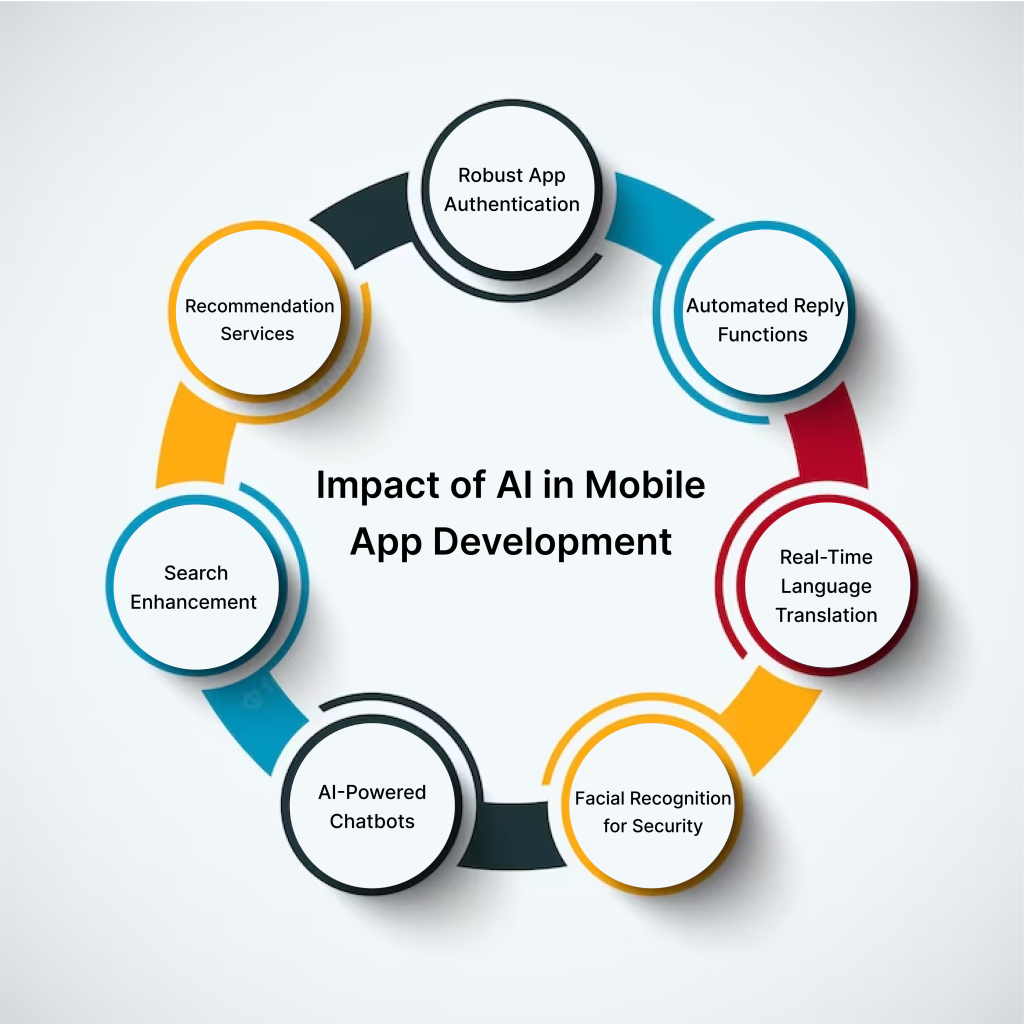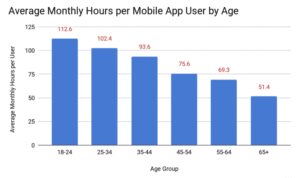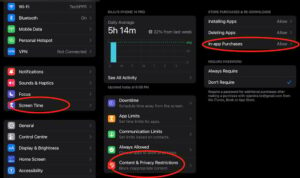With The Impact of AI on Android App Development at the forefront, we delve into how artificial intelligence is reshaping the landscape of mobile applications. As technology evolves, AI plays an increasingly pivotal role, enhancing functionalities and driving user engagement. From the early stages of app development to the sophisticated algorithms we see today, AI has transformed how developers create and users interact with their apps.
This exploration will not only define the essence of AI in Android development but also highlight the significant advancements brought forth by key technologies like Machine Learning and Natural Language Processing. As we navigate through the benefits and challenges, it becomes clear that integrating AI is not just a trend but a necessity for modern app development.
Introduction to AI in Android App Development

Artificial Intelligence (AI) has fundamentally transformed the landscape of Android app development. By integrating AI technologies, developers can create more intuitive, responsive, and personalized applications that significantly enhance user experiences. AI plays a critical role in automating processes, analyzing data, and enabling advanced features like natural language processing, image recognition, and predictive analytics within mobile applications.The significance of AI technologies in mobile applications cannot be overstated.
They empower developers to build smarter apps that can learn from user behaviors and adapt accordingly. This results in applications that not only cater to the needs of users but also anticipate them, creating a more engaging and efficient interaction. Over the years, the evolution of AI in app development has progressed from simple rule-based systems to complex machine learning algorithms capable of processing vast amounts of data in real-time.
Evolution of AI in App Development
The journey of AI in app development has been marked by several key phases, each contributing to the sophistication of mobile applications today. Initially, developers relied on basic algorithms to perform specific tasks, but advancements in technology led to the adoption of machine learning frameworks and deep learning models. The following points highlight critical milestones in this evolution:
- Early AI Integration: The introduction of AI in mobile apps began with simple chatbots and automated customer service functionalities, which provided basic interaction capabilities.
- Machine Learning Frameworks: The emergence of frameworks like TensorFlow and PyTorch facilitated the implementation of machine learning algorithms in Android applications, allowing for more complex data processing and insights.
- Natural Language Processing: AI advancements in NLP enabled apps to understand and respond to user queries in natural language, resulting in enhanced user engagement and satisfaction.
- Predictive Analytics: By leveraging big data, apps can now predict user preferences and behaviors, making personalized recommendations that enhance the user experience.
- Image and Speech Recognition: AI technologies have advanced to enable real-time image and voice recognition, opening new avenues for user interaction and content creation.
AI’s role in Android app development represents a significant shift towards more intelligent applications that not only respond to user inputs but also learn and evolve along with user interactions. The continuous advancements in AI technologies promise even more innovative features and functionalities in the future, further solidifying the importance of AI in mobile app development.
Key Technologies Driving AI in Android Development
The advent of artificial intelligence has significantly transformed Android app development, enabling developers to build smarter and more efficient applications. Several key technologies are at the forefront of this transformation, each contributing uniquely to enhancing app functionality and user experience.
Major AI Technologies in Android Development
A variety of AI technologies play a crucial role in developing Android applications. These technologies not only streamline the development process but also add a layer of intelligence to the apps. Here are some of the most significant ones:
- Machine Learning: This technology allows apps to learn from data and improve their performance over time. Machine learning models can predict user behavior, personalize content, and enhance features like recommendation systems.
- Natural Language Processing (NLP): NLP enables apps to understand and process human language, facilitating better user interactions through chatbots and voice recognition systems.
- Computer Vision: This technology empowers apps to interpret and make decisions based on visual data. It is crucial for applications that involve image recognition, facial recognition, and augmented reality.
Impact of Machine Learning and Natural Language Processing on App Functionality
Machine Learning (ML) and Natural Language Processing (NLP) are powerful components that enhance the functionality of Android applications. By integrating these technologies, developers can create more intuitive and responsive applications.Machine Learning algorithms analyze user data to identify patterns and make predictions. For instance, a music streaming app can recommend songs based on a user’s listening history, adapting to their preferences over time.
This adaptability not only improves user satisfaction but also increases engagement and retention.Natural Language Processing, on the other hand, enables apps to engage in human-like conversations. With NLP, apps can process and respond to text or voice inputs, making user interactions seamless. For example, virtual assistants like Google Assistant utilize NLP to understand user commands, providing quick and accurate responses, which enhances user experience significantly.
Enhancement of User Experience through Computer Vision Technologies
Computer vision technologies bring a new dimension to user experiences in Android applications. By allowing apps to understand and interpret visual information, computer vision enhances interactivity and functionality.Applications can utilize computer vision in various ways, such as:
- Image Recognition: Apps use this feature to identify objects, scenes, and faces in images. For instance, photo-editing apps can automatically tag friends in pictures.
- Facial Recognition: This technology is employed for user authentication, enhancing security while providing a convenient login experience.
- Augmented Reality (AR): AR applications utilize computer vision to overlay digital information onto the physical world, enriching user engagement. For example, games like Pokémon GO use AR to blend the virtual and real worlds.
In summary, the integration of these key AI technologies in Android app development not only enhances functionality but also significantly improves user experience, leading to more innovative and engaging applications.
Benefits of Integrating AI into Android Apps
The integration of artificial intelligence in Android app development offers numerous advantages that significantly enhance the overall user experience, streamline development processes, and bolster security. As developers increasingly leverage AI technologies, apps become more engaging, intuitive, and robust, meeting user expectations while also simplifying the development lifecycle.
User Engagement and Personalization
AI enhances user engagement by analyzing user behavior and preferences, enabling apps to offer personalized experiences. This personalization leads to higher user satisfaction and retention rates. Here are some key ways AI contributes to this benefit:
- Personalized Recommendations: AI algorithms analyze user interactions and preferences to suggest relevant content, products, or features, making the app more engaging.
- Dynamic User Interfaces: AI can adapt the user interface based on user behavior, ensuring that the most relevant features are accessible, thus improving usability.
- Targeted Notifications: By utilizing machine learning models, apps can send customized notifications that resonate with individual users, increasing the likelihood of interaction.
Advantages of Automation in App Development
Automation, powered by AI, streamlines various stages of app development, from coding to testing and deployment. This not only accelerates the development timeline but also enhances overall product quality. Key benefits include:
- Code Generation: AI tools can generate boilerplate code, allowing developers to focus on more complex tasks, thus speeding up the development process.
- Automated Testing: AI can execute tests at a much faster rate than manual testing, identifying bugs and vulnerabilities early in the development cycle.
- Predictive Analytics: AI can forecast project timelines and potential bottlenecks, enabling teams to allocate resources more effectively and manage risks proactively.
Enhancing App Security and User Data Protection
AI plays a critical role in bolstering app security and safeguarding user data against increasing cyber threats. By implementing AI-driven security measures, developers can enhance the integrity of their applications. Key security features include:
- Anomaly Detection: AI algorithms continuously monitor user activity and can flag unusual behavior that may indicate a security breach.
- Fraud Prevention: AI systems can analyze patterns to detect fraudulent activities in real-time, providing an extra layer of protection for users.
- Data Encryption: AI can facilitate advanced encryption techniques that protect sensitive user data, ensuring compliance with regulations such as GDPR.
AI integration not only transforms the user experience but also streamlines the development process and enhances security, making it an indispensable asset in modern Android app development.
Challenges and Limitations of AI in Android Development
Integrating AI into Android app development brings a myriad of benefits, but it also comes with its fair share of challenges and limitations. Developers face various hurdles when aiming to implement AI technologies effectively, and being aware of these can help in navigating the complexities of this integration.One of the prominent challenges in AI integration involves the requirement for extensive datasets.
The effectiveness of AI models largely depends on the quality and quantity of data they are trained on. In mobile applications, obtaining sufficient and relevant data can be a tedious process due to privacy constraints and the need for user consent. Additionally, developers often have to deal with the issue of model performance on hardware with limited resources. Mobile devices have constraints regarding processing power and memory, which can hinder the execution of sophisticated AI algorithms.
Common Challenges in AI Integration, The Impact of AI on Android App Development
Several common challenges arise during the integration of AI into Android applications. These challenges can significantly impact the development process and the overall user experience. Key challenges include:
- Data Privacy and Security: Safeguarding user data while ensuring compliance with regulations like GDPR can be complicated when implementing AI.
- Resource Constraints: Mobile devices typically have limited computational power, affecting the performance of AI algorithms.
- Algorithm Complexity: Many AI algorithms require extensive training and fine-tuning, which can complicate the development cycle.
- Integration with Existing Systems: Merging AI functionalities with pre-existing app architectures can introduce compatibility issues.
Limitations of Current AI Technologies
Despite the advancements in AI technologies, there are inherent limitations that developers must navigate. These limitations can affect the usability and functionality of AI-powered applications.Current AI models often struggle to generalize across diverse scenarios. For instance, a model trained to recognize objects in specific lighting conditions may fail in different environments. Moreover, many AI solutions lack transparency; developers and users may not fully understand how decisions are made by AI systems, leading to trust issues.
Another significant limitation involves the latency in real-time processing. Mobile applications requiring instant responses can falter if the AI processes are cloud-dependent, compromising the user experience.
Ethical Concerns in AI Usage
The ethical implications of deploying AI in Android app development cannot be overlooked. Key ethical concerns include:
- Bias in Algorithms: AI systems can perpetuate and amplify biases present in training data, leading to unfair treatment of certain user groups.
- Job Displacement: The rise of AI may lead to concerns regarding job losses in fields where automation can replace human labor.
- Informed Consent: Users must be adequately informed about how their data is being used by AI systems, which poses challenges in transparency and trust.
- Manipulation and Surveillance: Increased reliance on AI can lead to misuse of data for manipulative purposes or invasive surveillance practices.
Future Trends of AI in Android App Development
The future of AI in Android app development is poised for significant transformation as technological advancements pave the way for smarter, more intuitive applications. As developers increasingly adopt AI technologies, the user experience is expected to become more personalized and seamless, enabling innovative solutions to emerge in the mobile landscape. This section explores potential developments in AI, the impact of 5G, and evolving user behaviors that will shape the future of AI in mobile applications.
Potential Developments of AI Technologies in Mobile Apps
One of the most exciting trends in AI is the integration of advanced machine learning algorithms that can analyze vast amounts of data in real-time. This capability allows for more precise user behavior predictions and personalized experiences. For instance, mobile apps could leverage natural language processing (NLP) to facilitate more fluid interactions, understanding user queries contextually rather than relying solely on s.
Moreover, augmented reality (AR) and AI are expected to converge, creating immersive experiences in mobile applications. This combination can enhance shopping experiences, education, and gaming by providing users with interactive environments that adapt based on their preferences and interactions.
Impact of 5G Technology on AI-Driven Applications
The rollout of 5G technology is set to revolutionize the capabilities of AI-driven applications. With higher bandwidth and reduced latency, 5G will enable mobile apps to process data more rapidly and efficiently, unlocking new potential for real-time applications. For example, AI-powered apps in healthcare could leverage 5G to facilitate remote patient monitoring and telemedicine services, allowing healthcare professionals to receive immediate data and analytics from wearable devices.
This improvement in connectivity will also enhance cloud-based AI services, making it easier for applications to utilize complex algorithms without being constrained by device limitations.
Trends in User Behavior Shaping AI Features
As user expectations evolve, so too will the features of AI-driven mobile applications. Users are increasingly demanding personalized experiences that cater to their specific needs and preferences. This trend will influence the development of AI features that prioritize user-centric design and functionality.Additionally, the rise of voice-activated technology will encourage developers to integrate more sophisticated voice recognition and synthesis capabilities into their apps.
Users are becoming accustomed to interacting with devices through voice commands, and AI can enhance this experience by providing context-aware responses.Furthermore, there is a growing emphasis on privacy and data protection, which will drive the development of more transparent AI algorithms. Users now prefer applications that prioritize data security and offer clear explanations of how their data is utilized, prompting developers to adopt ethical AI practices while enhancing user trust.
Case Studies of Successful AI-Driven Android Apps: The Impact Of AI On Android App Development
The integration of AI into Android applications has led to transformative enhancements in user experience and functionality. Numerous popular Android apps have effectively harnessed AI technologies to provide unique features that cater to user needs and preferences. This section delves into some leading examples, highlighting their standout AI capabilities and overall reception by users.
Popular AI-Driven Android Apps
Several Android apps have achieved notable success by incorporating AI into their core functionalities. Below are examples of such applications, showcasing the innovative features that AI has introduced:
- Google Assistant: This AI-powered virtual assistant uses natural language processing (NLP) to understand user commands and provide personalized responses. Users appreciate its ability to manage tasks, control smart devices, and answer questions in a conversational manner.
- Snapchat: The app employs AI to enhance images through filters and AR lenses. Users enjoy the fun and engaging experience of altering their appearance or surroundings with real-time visual effects, significantly boosting user engagement.
- Spotify: By utilizing AI algorithms, Spotify curates personalized playlists and music recommendations based on listening habits. User feedback highlights the app’s ability to discover new artists and songs tailored to individual tastes, creating a more enjoyable listening experience.
- Pinterest: AI is used in Pinterest to analyze user behavior and suggest relevant content. The recommendation engine has garnered positive reception, helping users discover ideas and inspirations that align closely with their interests.
- Google Photos: Leveraging AI for image recognition, Google Photos automatically categorizes and organizes photos based on people, places, and events. Many users praise the ease of searching for specific images without manually tagging them.
Unique Features Introduced by AI
The integration of AI in these applications has resulted in various unique features that enhance user interaction and satisfaction. Key features include:
- Personalization: AI algorithms analyze user data to tailor content and experiences, leading to higher user satisfaction and engagement.
- Real-Time Interaction: AI enables applications to provide real-time feedback and responses, making interactions more dynamic and engaging.
- Automated Enhancements: Applications can autonomously improve content, such as image filtering, music recommendations, and task automation, providing users with streamlined experiences.
- Predictive Capabilities: AI can anticipate user needs based on previous interactions, enhancing functionality and providing timely suggestions.
User Feedback and Reception
User feedback plays a crucial role in evaluating the effectiveness of AI integration in Android apps. The overall reception of AI-driven applications has been overwhelmingly positive, with many users appreciating the enhanced capabilities and ease of use.
“AI features in apps like Google Assistant and Spotify have fundamentally changed the way I interact with technology. They understand my preferences and make my life easier.”
User Review
Users have reported increased satisfaction due to the efficiency and personalization offered by these AI capabilities. Moreover, the ability to automate mundane tasks and provide tailored recommendations has led to enhanced loyalty and continued usage of these applications. Despite minor challenges in understanding user commands, the overall sentiment indicates that AI-driven features have significantly enriched the Android app experience.
Best Practices for Implementing AI in Android Development
Integrating AI into Android applications can significantly enhance user experience, streamline processes, and enable functionalities that were previously unimaginable. However, successful implementation requires careful planning and execution. This section Artikels best practices that developers should follow to effectively integrate AI while ensuring performance, security, and user satisfaction.
Strategies for Integrating AI into Android Applications
To ensure the effective integration of AI technologies in Android apps, developers should focus on several key strategies. These practices not only enhance the performance of AI functionalities but also align them with user needs and expectations.
- Define Clear Objectives: Before integrating AI features, developers should identify the specific problems they aim to solve or the enhancements they want to achieve. For instance, using AI for personalized recommendations in e-commerce apps can significantly improve user engagement.
- Utilize High-Quality Data: AI systems rely heavily on data. Gathering accurate and relevant data from reliable sources is crucial for training AI models effectively. For example, a fitness app may utilize user activity data to provide personalized workout plans.
- Leverage Existing Frameworks: Utilizing established AI frameworks and SDKs, such as TensorFlow Lite or ML Kit, can simplify the integration process. These tools provide pre-built models and functionalities that can be tailored to specific app needs.
Testing and Optimizing AI Functionalities
Testing AI functionalities in mobile apps is essential to ensure they operate as intended and deliver user satisfaction. Developers should adopt comprehensive testing strategies to validate AI features.
- Simulate Real-World Scenarios: Testing should involve real-world usage scenarios to accurately assess how AI features perform under various conditions. For example, a language translation app should be tested with diverse languages and dialects.
- Conduct A/B Testing: Implementing A/B testing can help determine which AI features resonate better with users. This approach allows developers to refine functionalities based on user feedback and interaction metrics.
- Continuous Monitoring: Post-launch, it’s important to continuously monitor AI features for performance and accuracy. Analytics tools can help identify areas of improvement and user engagement patterns.
Maintaining User Privacy with AI Features
As AI applications often handle sensitive user data, maintaining user privacy is paramount. Developers must prioritize data protection to build trust and comply with legal standards.
- Implement Data Minimization: Only collect data that is necessary for AI functionalities. This approach reduces the risk of data breaches and enhances user trust.
- Ensure Transparency: Inform users about what data is collected and how it will be used. Clear privacy policies and user consent forms can foster transparency.
- Utilize Encryption: Employ encryption techniques to protect user data during transmission and storage. This measure safeguards sensitive information from unauthorized access.
“The integration of AI into mobile applications is not just about enhancing functionality; it is also about respecting user privacy and building trust through responsible data handling.”
Tools and Resources for AI in Android Development
The integration of artificial intelligence (AI) into Android development is transforming the way mobile applications are built and experienced. To successfully harness AI, developers need access to the right tools, libraries, and educational resources. This section covers some essential tools and platforms that can aid Android developers in their AI endeavors.
Essential Tools and Libraries for AI Development in Android
Choosing the right tools and libraries is crucial for effective AI development in Android applications. Several libraries are widely recognized for their capabilities in implementing AI features seamlessly.
- TensorFlow Lite: A lightweight version of TensorFlow designed specifically for mobile and edge devices, allowing developers to run machine learning models efficiently.
- ML Kit: A mobile SDK from Google that provides various APIs for common machine learning tasks, such as text recognition, face detection, and barcode scanning.
- Pytorch Mobile: This tool enables developers to bring PyTorch models to mobile platforms while maintaining performance and usability.
- Keras: A high-level neural networks API that can run on top of TensorFlow, allowing for easier model building and experimentation.
- OpenCV: An open-source computer vision and machine learning software library that provides tools for image processing, face detection, and more.
Resources for Learning AI Integration in Mobile Apps
For developers looking to enhance their skills in AI integration, numerous learning resources can provide in-depth knowledge and practical experience.
- Coursera: Offers specialized courses on machine learning and AI that cover foundational concepts and practical applications in mobile development.
- Google’s TensorFlow Documentation: Comprehensive documentation that includes tutorials and examples for implementing TensorFlow in Android apps.
- Udacity: Provides nanodegree programs focused on AI and machine learning, specifically tailored for mobile developers.
- Medium Articles and Blogs: Numerous articles written by industry experts can offer insights into best practices and innovative applications of AI in Android development.
Platforms Supporting AI Features for Android Developers
Several platforms offer robust support for integrating AI features into Android applications, streamlining the development process and enhancing app functionality.
- Google Cloud AI: Provides a suite of machine learning services that can be directly integrated into Android apps, offering capabilities like natural language processing and image analysis.
- IBM Watson: A powerful suite of AI tools that assists developers in adding cognitive features to their applications, such as language translation and sentiment analysis.
- AWS Machine Learning: Amazon Web Services offers a range of machine learning services that developers can utilize to build intelligent apps with features like predictive analytics.
- Microsoft Azure AI: Azure provides various AI tools and APIs, enabling developers to create sophisticated applications with capabilities like speech recognition and computer vision.





